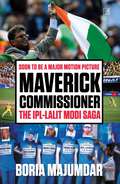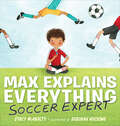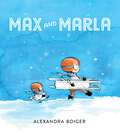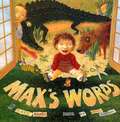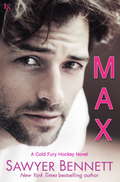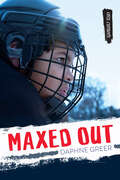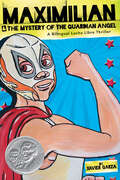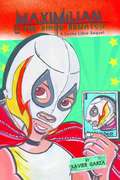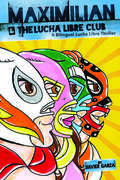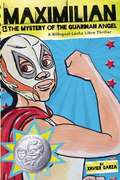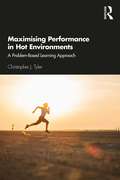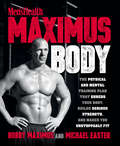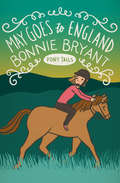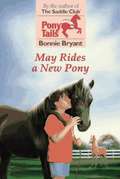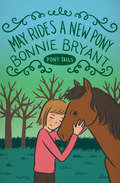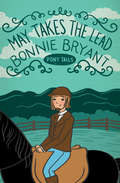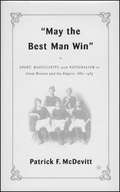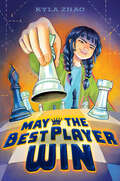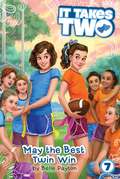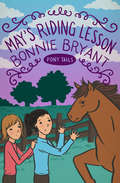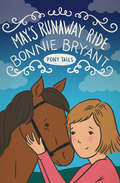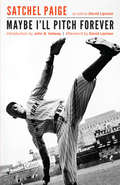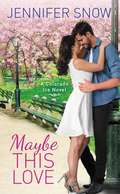- Table View
- List View
Maverick Commissioner
by Boria MajumdarThe Indian Premier League. Its mere mention forces cricket fans across the world to sit up and take notice. World cricket&’s most valued property has only grown stronger with time. Conceived and implemented by Lalit Modi in 2008, the IPL has forever revolutionised the way cricket is marketed and run globally. Modi had built and orchestrated the tournament by his own rules and after the stupendous success of the IPL, the same rules were questioned by the administration. Modi was subsequently banned for life.How and why did it happen? What went on behind the scenes? How did it all start to go wrong between Modi and the others? Are there secrets that will never come out? This book is all about everything you never got to know. Each fact corroborated by multiple sources who were in the thick of things, Maverick Commissioner is a riveting account of the IPL and the functioning of its founder, Lalit Kumar Modi. Did Modi have a long telephone conversation with a BCCI top brass the day he left India for good? What really was discussed? Is Lalit Modi the absent present for the IPL and Indian cricket?Soon to be made into a film by Vibri Motion Pictures, Maverick Commissioner documents things exactly as they happened. No holds barred and no questions left out. It doesn&’t judge Lalit Modi. All it does is narrate his story. Who is the real Lalit Modi? Let the readers decide.
Max Explains Everything: Soccer Expert
by Stacy McAnultyThis hilarious, tongue-in-cheek guide from kid-expert Max reveals everything you need to know about the game of soccer.Max knows a lot about soccer. After all, he's been playing it for almost three weeks! So he's pretty much an expert. Here Max shares his one-of-a-kind helpful tips including how to warm up (stretch, twirl, somersault), who's who on the field (the ref is in yellow and wears a whistle--you should not bring your own whistle), and what to do with your hands since you can't touch the ball (wave at fans, hide them in your shirt, play itsy-bitsy spider). But could Max possibly be forgetting something very important? Full of humor, energy, and warmth, Max Explains Everything: Soccer Expert is the perfect read aloud for novice players as well as for fellow "kid experts" on the game.Want more fun with Max? Don't miss Max Explains Everything: Grocery Store Expert.
Max and Marla
by Alexandra BoigerTwo fearless Olympians sled to victory in this delightful new picture book Max and Marla are best friends. And aspiring Olympians! With their eyes on the prize, they know exactly what it&’ll take to reach sledding success: preparation, practice and perseverance. So when rusty blades, strong winds and difficult slopes get in their way, Max and Marla realize true joy lies not in winning but in friendship. Obstacles turn into victories!With delightful illustrations and charming text, Alexandra Boiger brings to life the story of two unstoppable pals—true Olympians who never give up!
Max's Words
by Kate BanksWhen Max cuts out words from magazines and newspapers, collecting them the way his brothers collect stamps and coins, they all learn about words, sentences, and storytelling.
Max: A Cold Fury Hockey Novel (A Cold Fury Hockey Novel #6)
by Sawyer Bennett<P>The ice is a cold mistress. As the league’s most eligible goalie, Max Fournier has access to his fair share of willing puck bunnies, but right now he’s more interested in bringing home another championship than a one-night stand. A romantic at heart, Max believes in love; he’s just not great at relationships. <P> So when he finally meets a nice girl who’s not blinded by his celebrity, he’s feeling the heat—and the pressure to save her from herself. Between working two jobs and raising her sister’s kids, Julianne Bradley doesn’t have time for sports—or men. All she knows about Max is that he’s the sexiest customer to ever grace her gas-station counter. And he sees past her tired eyes and makes Jules yearn for things she can’t have: a glamorous fling, a passionate lover, and the time to enjoy both. <P>Max makes her feel like Cinderella, even though Jules has enough baggage to crush a glass slipper. Luckily, he’s no prince—only a fierce competitor determined to win her heart. <P><b>A New York Times Bestseller</b>
Maxed Out (Orca Currents)
by Daphne GreerTwelve-year-old Max just wants to play hockey. But ever since his dad died, Max's mom has been struggling. Now Max has to take his brother, Duncan, who is autistic, with him wherever he goes. Max's team is counting on him to help them win the upcoming playoff game against the Red Eagles, but one practice makes it clear that it's not safe to leave his brother unattended on the sidelines. With only a week to figure out how he can play in the big game, Max is feeling the pressure. Will he find a way to be a good teammate, a good brother and a good son, or is it all too much for one kid? This short novel is a high-interest, low-reading level book for middle-grade readers who are building reading skills, want a quick read or say they don’t like to read! The epub edition of this title is fully accessible.
Maximilian & the Mystery of the Guardian Angel: A Bilingual Lucha Libre Thriller (Max's Lucha Libre Adventures #1)
by Xavier GarzaPura Belpré Author Award Honor - American Library Association (ALA)A Pura Belpré Author Honor Award winner Una Pura Belpré Premio de Autor Infantil (Libro de Honor) Maximillian's summer vacation resembles one of his beloved lucha libre movies: grudge matches, fantastic villains and the Guardian Angel. Las vacaciones de verano de Maximillian se parece a una de sus queridas películas de lucha libre: partidos de rencor, villanos fantásticos y el Ángel Guardián.Maximillian is just another 11-year-old lucha libre fan. He goes to the matches, watches the movies and collects the masks of his favorite wrestlers, especially the Guardian Angel. But when he tumbles over the railing at a lucha libre match in San Antonio, Max makes a connection to the world of Mexican wrestling that will ultimately link him--maybe by blood! --to the greatest hero of all time: The Guardian Angel. What was shaping up to be one boring summer before 6th grade now seems like a story straight out of Max's beloved lucha libre movies! *** Un cuento bilingüe, ganador de Pura Belpré. Maximillian es solo otro fan de lucha libre de 11 años. Él va a los partidos, mira las películas y colecciona las máscaras de sus luchadores favoritos, especialmente el Ángel Guardian. Pero cuando cae por la barandilla en un combate de lucha libre en San Antonio, Max hace una conexión con el mundo de la lucha mexicana, que finalmente lo vinculará, ¡tal vez por sangre! --Al héroe más grande de todos los tiempos: El Ángel Guardian.
Maximilian and the Bingo Rematch
by Xavier GarzaMaximilian & the Bingo Rematch is the sequel to Maximilian & the Mystery of the Guardian Angel, an honor book for the Pura Belpre Award. Xavier Garza rules the ring when it comes to writing and illustrating action-packed, high-interest books filled with crazy comic-book art and set in the emotionally charged world of sixth grade. <P> In Maximilian & the Mystery of the Guardian Angel, Max tumbles over the railing at a lucha match in San Antonio and makes a connection to the world of Mexican wrestling that will ultimately link him to the greatest hero of all time: the Guardian Angel. He also falls in love with the beautiful Cecilia Cantú. In Maximilian & the Bingo Rematch, suddenly everybody seems to be fighting: a couple of cranky tías who, like lucha libre rudos, will stop at nothing to triumph in the church's lotería game; his masked uncles going for the tag-team title of the world; and a green-eyed vixen named Paloma who challenges his love for Cecilia. Will good triumph over evil? Max sure hopes so! <P> Winner of the NACCS-Tejas Foco Young Adult Fiction Book Award and the Texas Institute of Letters H-E-B Award for Best Children's Book. 2014-15 Tejas Star Reading List Selection. Xavier Garza was born in the Rio Grande Valley of Texas. He is an enthusiastic author, artist, teacher, and storyteller whose work is a lively documentation of the dreams, superstitions, and heroes in the bigger-than-life world of south Texas. Garza has exhibited his art and performed his stories in venues throughout Texas, Arizona, and the state of Washington. He lives with his wife and son in San Antonio, Texas.
Maximilian and the Lucha Libre Club: A Bilingual Lucha Libre Thriller
by Xavier GarzaThe fights still rage on in the third installation of Max's Lucha Libre Adventures series. Max seems like any other nerdy kid until he's asked to join the Lucha Libre Club. The super-secret club admits only the offspring of wrestling royalty. And Max is a prince, descended through his mother from royal blood, his uncle the very king of lucha libre: The Guardian Angel. Trouble is, the club is so secret that Max can't tell his best friend or girlfriend what he is up to. Just that vexing girl, Paloma.Xavier Garza lives in San Antonio, Texas.
Maximilian and the Mystery of the Guardian Angel: A Bilingual Lucha Libre Thriller
by Xavier GarzaEleven-year-old Maximilian, a big fan of the form of wrestling known as lucha libre, begins to suspect that he has a close connection with his favorite luchador, El Angel de La Guardia, the Guardian Angel.
Maximising Performance in Hot Environments: A Problem-Based Learning Approach
by Christopher J. TylerEnsuring high levels of performance and safety in hot climates is a key consideration for sport scientists and coaches. Maximising Performance in Hot Environments is the first book with a project-based approach to focus solely on exercise in this common climactic condition, providing students and coaches with a clear and concise introduction to working with athletes in the heat. Rigorous in its physiological underpinnings, the book adopts a problem-based learning approach, encouraging students to engage with the science and apply it to practical, real-world scenarios. Posing questions such as "how should athletes be monitored in high temperatures", "what are the ideal conditions for setting a world record in a 10,000m race", and "what special considerations should be made when working with masters athletes", the book covers all key topics, including: The basics of human thermoregulation The effect of high temperatures on performance Heat acclimation and acclimatisation Cooling Hydration Preventing heat-related illness and injury Offering pedagogical features throughout to further enhance student learning, this is a truly innovative and unique resource. It is crucial reading for any student taking classes in environmental physiology, important applied reading for any exercise physiology students, and a vital companion for any sport scientist or coach working with athletes in high temperatures.
Maximus Body: The Physical and Mental Training Plan That Shreds Your Body, Builds Serious Strength, and Makes You Unstoppably Fit
by Bobby Maximus Michael EasterMen's Health magazine's #1 personal trainer delivers cutting-edge, high-intensity workouts to help you pack serious muscle and become unstoppably fit. From the man responsible for the gym that trained the actors in the movie 300 comes cutting-edge fitness strategies, 100 workouts, and a training plan that has successfully transformed A-list actors and actresses, elite special-forces soldiers, all-star athletes, and everyday men and women. With Bobby Maximus’s guidance you too can become one of the most insanely fit people the world has ever seen. The diets and workouts that promise easy results in minutes per day have tricked masses into wasting their money on false promises. Supplements, smoothies, and 4-minute workouts aren’t getting people any fitter. Getting that shredded body requires real commitment and real work—and Bobby can show you how. Maximus Body features circuit-style workouts that will push you to your limits and work your whole body. With a plethora of exercises like “Don’t Ask Me About Your Abs,” that work your core with a combination of sit ups, push ups, pull ups, and even leg raises, you can develop an exercise routine that fits your needs. Whether you are overweight and trying to get back into shape, or a high-level athlete trying to gain that extra edge, Maximus Body offers up thousands of once-secret ways to burn fat, add lean muscle, reveal a shredded 8-pack, and build mind-bending physical fitness.
May Goes to England (Pony Tails #11)
by Bonnie BryantWild ponies aren&’t the only creatures living in the English countryside May and her family are traveling to England for vacation. She&’s going to miss her friends the Pony Tails and her pony Macaroni, but she can&’t wait to start exploring. May&’s big sisters, Ellie and Dottie, have been telling her stories about the pesky piskies of Cornwall—mischievous spirits who cause trouble. But luckily, Cornwall is also home to wild ponies, and May is determined to see one. But when the girls head out to look for them, Ellie gets hurt. Could this be the work of the piskies?
May Rides a New Pony (Pony Tails #8)
by Bonnie BryantMay Grover has bad news. Her pony, Macaroni, has a sore foot, and she can't ride him until he's better. But May's dad has the perfect solution: She can help him train his new student--a smart pony named Zeus.
May Rides a New Pony (Pony Tails #8)
by Bonnie BryantWhen May&’s pony needs to recover from an injury, she helps her father train a new horseMay&’s pony, Macaroni, has a sore foot, and she can&’t ride him for a week or two. But May can&’t stay away from the stables—she&’s too pony crazy for that! She decides to help her father train his smart new pony, Zeus, and is so busy that she hardly misses riding Macaroni.But Macaroni is jealous, and May starts to feel left out herself when her best friends in the Pony Tails seem to forget about her. How can the girls get back into their old groove?
May Rides a New Pony (Pony Tails #8)
by Bonnie BryantWhen May&’s pony needs to recover from an injury, she helps her father train a new horseMay&’s pony, Macaroni, has a sore foot, and she can&’t ride him for a week or two. But May can&’t stay away from the stables—she&’s too pony crazy for that! She decides to help her father train his smart new pony, Zeus, and is so busy that she hardly misses riding Macaroni.But Macaroni is jealous, and May starts to feel left out herself when her best friends in the Pony Tails seem to forget about her. How can the girls get back into their old groove?
May Takes the Lead (Pony Tails #5)
by Bonnie BryantMay decides to prove to her big sisters that having a pony is not just for kidsHorses have always been the biggest part of May&’s life. Her father was a horse trainer and her mom rode too. Even May&’s best friends, Jasmine and Corey, share her passion for ponies. But ever since May&’s big sisters moved on to soccer and boys, they think her love of ponies is childish.Can she ever get her sisters to understand? Sometimes she wishes she were an only child like Jasmine and Corey. But when May is chosen to lead the Pony Parade at Pine Hollow Stables, she sees it as a chance to prove that she&’s not a little kid anymore.
May the Best Man Win: Sport, Masculinity, and Nationalism in Great Britain and the Empire, 1880-1935
by Patrick F. McDevittAs Britain's great power status came to be increasingly challenged in the decades before the First World War, one by-product of the resultant uncertainty was the weakening of the Victorian, middle-class consensus of what constituted ideal manhood. Britain's empire was not only the source of wealth and power, but it simultaneously provided alternative models of masculinity and nationhood. Consequently, the empire and the commonwealth played an important role in defining imperial gender relations in both Britain and in the colonies and dominions. May the Best Man Win investigates the continual re-assessment and reassertion of various masculine ideals associated with sport in the British empire between 1880 and 1935.
May the Best Player Win
by Kyla ZhaoThe game is on in this fun-filled middle grade debut about chess, girl power, and performance anxiety in sports, perfect for fans of Kelly Yang and Celia C. Pérez!The clock is ticking for May Li, whose middle-school chess team just earned a victory at the state championship—and with it, a ticket to nationals. What&’s even more exciting is that May got an award for being the top female player and a splashy feature in the biggest chess magazine in the country.May should be thrilled. But some of her teammates, including her supposed-to-be-friend Ralph, aren&’t too pleased with the attention she&’s getting—and they&’re even questioning her skills. Backed into a corner, but not one to back down, May makes a move as bold as any of her chess tactics: She bets Ralph she can win the school&’s internal tournament and be chosen as team captain for nationals.The crown is May&’s for the taking . . . except she&’s starting to crumble under the weight of everyone&’s expectations. Anxious feelings begin to affect her performance and, what&’s worse, eat away at her love for the game. Now May is left to wonder: Can you still play for fun when you&’re playing to win?
May the Best Twin Win
by Belle PaytonAva and Alex are taking sibling rivalry to a whole new level in the seventh book of the It Takes Two series!It's Homecoming Week in Ashland! That means a big game, a big dance, and, most importantly, Powder Puff. But when Alex and Ava are placed on different teams for the middle school girls' flag football game, trouble brews. Ava is getting loads of extra attention because of her athletic ability, but this leaves Alex feeling majorly left out. Not one to hide from a little competition, Alex is determined to beat her sister at her own game by becoming her team's secret weapon! But Ava isn't worried about her jealous sister or Powder Puff. Because she has ADHD, she's supposed to get extra time on her tests, but her new substitute science teacher is refusing to give it to her. Ava knows it isn't fair--but how is she supposed to fix things in her science class and win Powder Puff for her team?
May's Riding Lesson (Pony Tails #2)
by Bonnie BryantThere&’s more than one way to stop a bullyWil never misses a chance to pick on best friends Jasmine, May, and Corey about playing with their toy horses. Not only do the girls love their real ponies, they love to play with their toy ones, too.May decides it&’s time to teach Wil a lesson. But even though Jasmine&’s feelings are hurt, she wants May to leave Wil alone. When she begins helping Corey train her pony, Samurai, for the scavenger hunt at Pine Hollow Stables, she realizes there might be a better way to stop a bully.
May's Runaway Ride (Pony Tails #14)
by Bonnie BryantAfter May&’s terrible day, riding her pony will make everything better . . . won&’t it? May can&’t seem to do anything right. First, she happens to wake up Jasmine&’s baby sister from a nap. Then she accidentally lets a puppy out of his pen, making Jasmine&’s mom chase him all morning. Unintentionally, May seems to be causing problems for the people around her. She knows that a nice afternoon ride with her friend Joey will cheer her up, but she winds up getting into even more trouble. Now all of her friends think she has run away from home! Can the Pony Tails save May from this awful day?
Maybe I'll Pitch Forever: A Great Baseball Player Tells The Hilarious Story Behind The Legend
by John B. Holway Leroy Paige David LipmanSatchel Paige was forty-two years old in 1948 when he became the first black pitcher in the American League. Although the oldest rookie around, he was already a legend. For twenty-two years, beginning in 1926, Paige dazzled throngs with his performance in the Negro Baseball Leagues. Then he outlasted everyone by playing professional baseball, in and out of the majors, until 1965. Struggle—against early poverty and racial discrimination—was part of Paige's story. So was fast living and a humorous point of view. His immortal advice was "Don't look back. Something might be gaining on you."
Maybe This Christmas (Colorado Ice #5)
by Jennifer SnowAll wrapped up . . . One more game. That's all that stands between NHL star Asher Westmore and a major career milestone. But then his brother bashes him against the hockey boards, sidelining him for months. Over Christmas holidays, no less. If staying off the ice doesn't drive him crazy, staying with his family will. The only bright spot amidst the mistletoe and twinkle lights: His best friend, Emma, is a physical therapist. And working out with her improves his body and his spirit.One last time. Emma Callaway was in trouble the minute she and Asher added benefits to their friendship. How is she supposed to resist a funny, caring guy who makes her toes curl? Her heart was safe while he lived in a different state. Now that he's back home recuperating, though, it's only a matter of time before she blurts out her feelings. Emma's only hope is that with a little holiday magic, she'll get the best Christmas gift of all."With the perfect blend of hockey, heart, and heat, Maybe This Time is a winner!" --- USA Today bestselling author Debbie Mason***The Colorado Ice seriesMaybe This KissMaybe This TimeMaybe This LoveMaybe This SummerMaybe This Christmas
Maybe This Love (Colorado Ice #3)
by Jennifer SnowTHE GAME OF HIS LIFEHockey player Ben Westmore has some serious skills---on and off the ice---and he's not above indulging in the many perks of NHL stardom. When a night in Vegas ends in disaster, he realizes two things: 1) it's time to lie low for a while, and 2) he needs a lawyer---fast. But the smoking-hot woman who walks into his office immediately tests all his good intentions.Olivia Davis doesn't need anyone derailing her career---or her dreams of starting a family---least of all a skirt-chasing player like Ben. But soon he's unleashing a full-court press to convince her that he's the real deal. She's slowly falling for his sweet, rugged charm, but with so much on the line, Olivia has to decide whether Ben can truly change---or if he's just playing the game.***The Colorado Ice seriesMaybe This KissMaybe This TimeMaybe This LoveMaybe This SummerMaybe This Christmas
